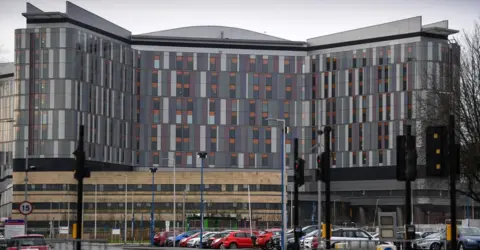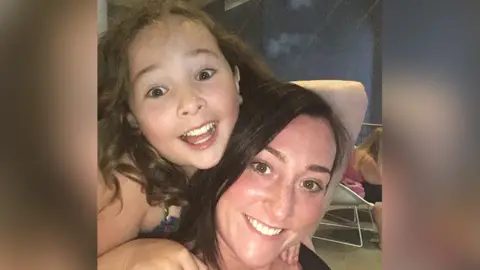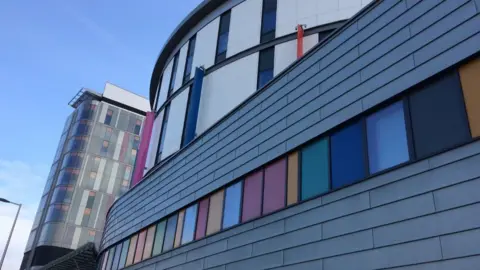Warning of 'high risk' to water supply at Glasgow hospital
 Getty Images
Getty ImagesWarnings about the risk of water contamination at Scotland's largest hospital were issued just days after it opened, according to a leaked report.
The 2015 inspection report into Glasgow's Queen Elizabeth University Hospital (QEUH) was passed to Labour MSP Anas Sarwar by whistleblowers.
It ranked infection control measures as "high risk" in several areas.
The hospital stayed open despite the warnings but has since had to close wards due to the risks from the water.
NHS Greater Glasgow and Clyde (NHSGGC) insists the hospital campus has a "safe and effective water supply" and all inspection reports have been acted upon.
'Warnings were ignored'
In the Scottish Parliament, Mr Sarwar said that he had seen figures which suggest there were 50 cases of infections at the Royal Children's Hospital - part of the £842m QEUH campus - between 2015 and 2018, and a further 15 unconfirmed cases so far this year.
The mother of 10-year-old Milly Main has previously said she was "100%" certain contaminated water caused her daughter's fatal infection after treatment for leukaemia in August 2017.
NHSGGC insisted it was impossible to determine the source of Milly's infection, and those of other children, because there was no requirement to test the water supply at the time.
At First Minister's Questions, Mr Sarwar claimed staff raised concerns about infections in the weeks before Milly's death.
He said that a month after her death "an assessment of the water supply again found the water was not safe and that there was a high risk of infections".
Mr Sarwar added: "At each of these stage the warnings were ignored and appropriate action was not taken."
Pressed on the warnings at first minister's questions, Nicola Sturgeon said she was determined to get the "answers parents deserve".
 Kimberly Darroch
Kimberly DarrochThe documents seen by Mr Sarwar show NHS Estates commissioned three separate independent reports into the water supply at the QEUH.
The first Legionella assessment, carried out by private contractor by DMA Water Treatment on 29 April 2015 - two days after the hospital welcomed its first patients - categorised the management of the bacteria as "high risk" because there was "significant communication issues between the parties" responsible for managing the risk.
The report also warned;
- there was a risk of stagnating water in parts of the 14-storey building, increasing the risk of infection
- that cold and hot water supplies were not running at the right temperature
- and that five plant rooms in the hospital were deemed to be "high risk"
Inspectors also found debris, including washers, in a water tank and recommended it was cleaned and disinfected.
Issues not acted upon
Further inspections by the same firm in September and October of 2017 found debris was still in the same water tank and said there had been "no significant water system alterations".
A further report in January last year categorised Legionella management on site as being "high risk" and called for immediate corrective action.
It states, "the information gathered highlights significant gaps in the Legionella (and potentially other bacteria) control on site, both in terms of management processes and the implementation of recommended preventative maintenance tasks".
On Thursday, the Scottish government appointed Lord Brodie to chair a public inquiry into issues at the QEUH and the delayed Royal Hospital for Children and Young People in Edinburgh, which was stopped from opening due to ventilation issues causing infection concerns.

Quizzed on the inspection reports at first minster's questions, Ms Sturgeon said: "The reason we have ordered the public inquiry is to make sure that in addition to all of the work that is being done, there is complete transparency, and if necessary complete accountability, around these issues.
"It is my job to make sure the Scottish government takes all appropriate action to get to the bottom of all these issues and that is what I and the health secretary are determined to do."
A spokeswoman for NHS Greater Glasgow and Clyde said: "The safety, wellbeing and confidence of our patients and our staff is, was and always will be our absolute priority.
"We fully acknowledge that there have been issues at this site and we have taken robust action to address these issues when we became aware of them.
"We led and asked for expert help to investigate and resolve these issues and reports about these incidents are available to the public."
The health board said all of the issues raised in the inspection reports were acted upon and said routine water sampling had been carried out from the time the hospital opened.
Specific infection tests were also carried out at the request of infection control doctors when investigating possible infections.
